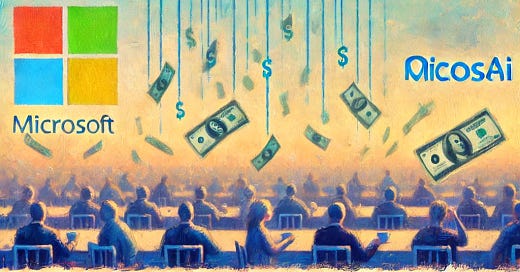Microsoft's Bold $60 Billion Stock Buyback
Microsoft's Bold Buyback and Investment Strategy: Leading the AI Revolution and Projecting an Optimistic Outlook.
Microsoft's Buyback Program: A Statement of Confidence
In a move that underscores Microsoft's financial strength, the company has announced a massive $60 billion stock buyback programme. This latest buyback matches its previous record-setting repurchase authorisation, signifying not just confidence in the company's future but a robust commitment to returning value to shareholders. Unlike many buyback plans, this programme has no expiration date, giving Microsoft the flexibility to implement it as market conditions dictate.
Furthermore, this initiative replaces the 2021 buyback programme, reflecting continuity in Microsoft’s long-term approach to rewarding investors. At a time when the broader tech industry faces volatility, Microsoft's buyback sends a clear message of resilience and optimism.
Dividend Increase: Strengthening Shareholder Value
In addition to its buyback programme, Microsoft has announced a 10% increase in its quarterly dividend, from 75 cents per share to 83 cents. For shareholders, this is a clear signal of confidence in Microsoft's sustained revenue growth and cash flow generation capabilities. The dividend increase becomes effective for shareholders as of November 2024, further reinforcing Microsoft's reputation as a shareholder-friendly enterprise.
With free cash flow of $23.3 billion in the fiscal fourth quarter of 2024, and cash reserves of $75.5 billion, Microsoft is well-positioned to continue its aggressive approach towards shareholder returns. The combination of buybacks and dividends is a powerful tool to boost shareholder returns and support long-term stock price appreciation.
Stock Price Performance: Riding the Wave of Success
Microsoft's stock price trajectory has been nothing short of stellar. In the past year alone, it has gained 31%, riding on the back of strong financial performance and strategic investments in key growth areas. As of the latest data, Microsoft’s stock trades at $417.14, approaching its all-time high closing price of $466.73 from July 2024. The company’s year-end closing prices over the past few years reflect its strong market presence and continuous growth.
With analysts projecting stock prices potentially reaching as high as $550 in 2025 and longer-term estimates suggesting values around $1,200 by 2030, Microsoft's stock continues to be a favourite among investors. However, these projections remain speculative, and the market's inherent volatility demands caution.
Strategic Investment in OpenAI: Shaping the Future of AI
Microsoft’s involvement in artificial intelligence has been transformative. Since its initial $1 billion investment in OpenAI in 2019, Microsoft has doubled down on AI with an additional $10 billion investment in January 2024. This brings Microsoft's total investment in OpenAI to an estimated $13 billion, to be injected in phases or pre-determined tranches.
Rather than a traditional equity stake, Microsoft’s investment in OpenAI grants it the right to a significant portion of OpenAI’s financial returns. This unconventional approach also includes vast amounts of Azure cloud credits, which have cemented Azure as OpenAI’s exclusive cloud provider. This partnership— a symbiotic relationship— is a crucial part of Microsoft’s broader strategy to dominate the AI market, in conjunction with OpenAI.
Integration of OpenAI: A Seamless Blend of AI and Everyday Technology
Microsoft has already integrated OpenAI’s cutting-edge AI technology across its product suite. From embedding ChatGPT in Bing, Edge, and Microsoft 365, to offering OpenAI’s GPT-4 on Azure, the partnership is already bearing fruit. Over 18,000 business customers are leveraging AI solutions via Microsoft’s Azure platform, showcasing the scale and reach of this collaboration.
This strategic partnership is pivotal for Microsoft as it positions itself as a leader in AI innovation. The integration of AI across its ecosystem ensures that Microsoft remains at the forefront of technological advancements, while also reducing its dependence on third parties in the rapidly evolving AI landscape.
A Glimpse into the Future: Navigating Uncertainty with Strategic Moves
The recent turmoil at OpenAI in November 2024, when CEO Sam Altman was briefly ousted, was a test for Microsoft. In a decisive move, Microsoft extended an offer to Altman and key OpenAI staff to lead its AI research division. This demonstrated Microsoft's commitment to maintaining control over its AI capabilities, ensuring that it is not overly reliant on external factors. The swiftness and confidence with which Microsoft acted during this moment of crisis highlight the company’s long-term vision and readiness to face challenges head-on.
Looking Forward: Robust Optimism for Microsoft and the Magnificent 7
Microsoft's recent strategic decisions, including the substantial buyback programme, dividend increase, and deep investment in AI through OpenAI, clearly indicate the company's unwavering belief in its long-term growth prospects. As part of the "Magnificent 7" tech giants—alongside Alphabet, Apple, Meta, Amazon, Nvidia, and Tesla—Microsoft's financial discipline and innovation prowess set it apart. It continues to lead the charge into the AI revolution while also rewarding shareholders with tangible returns.
The technological advancements pioneered by these tech titans, particularly in AI, cloud computing, and software services, are reshaping industries worldwide. As these companies chart new territories, their continued success is critical not just for their investors but for the broader global economy.
As Microsoft spearheads the transition into a future powered by AI and data-driven solutions, its focus on maintaining financial health and innovating at scale makes it a company poised for continued success. The optimism surrounding Microsoft and its peers in the "Magnificent 7" reflects a future brimming with possibilities, where technology continues to unlock new frontiers for businesses and individuals alike.




